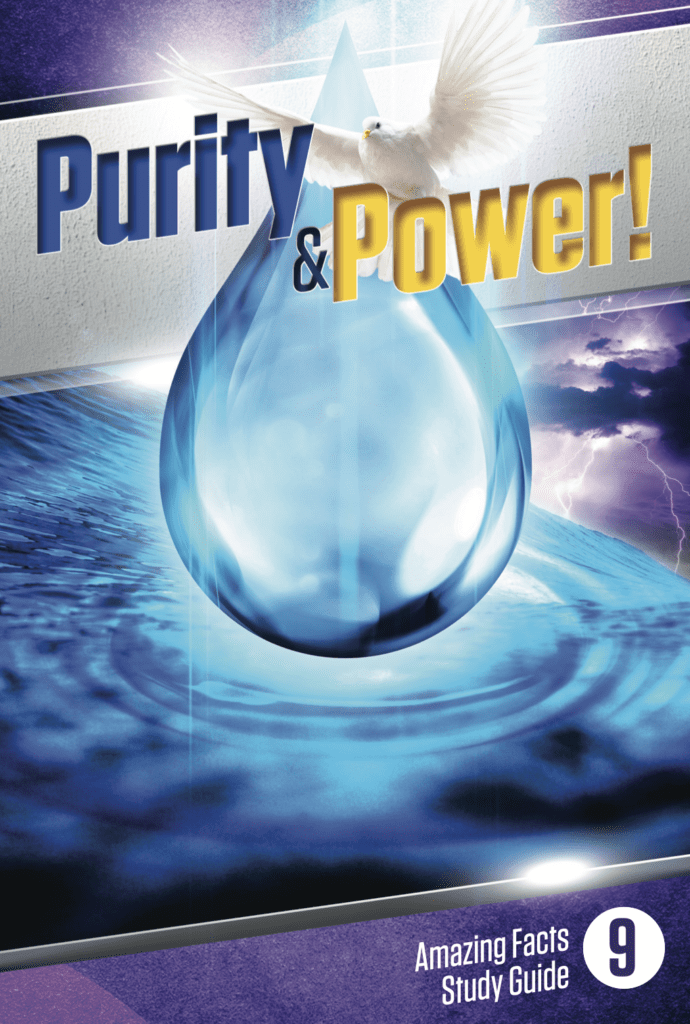 Lesson 9
Lesson 9

1. Is baptism really essential?
“He who believes and is baptised will be saved; but he who does not believe will be condemned” (Mark 16:16).
Answer: Yes! How could it be made any plainer?
2. But the thief on the cross was not baptised, so why should we be?
God understands our limitations as human beings. “He knows our frame; He remembers that we are dust” (Psalm 103:14).
Answer: The thief didn’t have the opportunity to restore what he had stolen, which is something God expects from those who can Ezekiel 33:15. God takes into account our capabilities and won’t require something physically impossible. If the thief had the chance, he likely would have chosen baptism. Baptism is a significant step for those who can take it.
3. There are many ordinances called “baptism.” Isn’t any one of these acceptable, provided a person is sincere about it?
“One Lord, one faith, one baptism” (Ephesians 4:5).
Answer: No. There is only one true baptism. All other so-called baptisms are counterfeits. The word “baptism” comes from the Greek word “baptisma.” It means “to dip under or submerge or immerse.” There are eight Greek words in the New Testament used to describe the application of liquids. But among these various words—meaning to sprinkle, to pour, or to immerse—only the one meaning “to immerse” (baptizo) is used to describe baptism.
Note: The devil’s “buffet” plan for baptism says, “Take your pick. The method of baptism doesn’t matter. It is the spirit that counts.” But the Bible says, “One Lord, one faith, one baptism.” It also says, “Obey the voice of the Lord which I speak to you” (Jeremiah 38:20).

4. How was Jesus baptised?
“Jesus … was baptised by John in the Jordan. And immediately, coming up from the water …” (Mark 1:9, 10).
Answer: Jesus was baptised by immersion. Notice that after the ordinance, He came “up from the water.” Jesus was baptised “in the Jordan,” not on the bank, as many believe. John the Baptist always found a place to baptise where “there was much water” (John 3:23), so it would be deep enough.
The Bible says we are called to follow Jesus’ example (1 Peter 2:21).

5. But didn’t the early church leaders change the method of baptism?
“Both Philip and the eunuch went down into the water, and he baptised him. Now when they came up out of the water, the Spirit of the Lord caught Philip away” (Acts 8:38, 39).
Answer: No. Please notice that Philip, a leader in the early Christian church, baptised the treasurer of Ethiopia by immersion precisely as John the Baptist baptised Jesus. No person, no matter his or her position in the church, is authorised to change God’s
direct commands.

6. Since Jesus and the disciples baptised by immersion, who introduced the other so-called baptisms that exist today?
“In vain they worship Me, teaching as doctrines the commandments of men” (Matthew 15:9).
Answer: Some people have introduced alternative forms of baptism that directly contradict the teachings of the Bible. This goes against the commandments of God and is a result of human traditions. In fact, Jesus criticised such behaviour, saying, “Why do you also transgress the commandment of God because of your tradition? … Thus you have made the commandment of God of no effect by your tradition” (Matthew 15:3, 6). Altering or diluting the sacred ordinance of baptism is a serious matter. No wonder the Bible exhorts us to “contend earnestly for the faith which was once for all delivered to the saints” (Jude 1:3).

7. What must a person do to prepare for baptism?
Answer:
A. Learn God’s requirements. “Go therefore and make disciples of all the nations, baptising them … teaching them to observe all things that I have commanded you” (Matthew 28:19, 20).
B. Believe the truth of God’s Word. “He who believes and is baptised will be saved” (Mark 16:16).
C. Repent and turn away from your sins and experience conversion. “Repent, and let every one of you be baptized in the name of Jesus Christ for the remission of sins” (Acts 2:38).
“Repent therefore and be converted, that your sins may be blotted out” (Acts 3:19).

8. What is the meaning of baptism?
“We were buried with Him through baptism into death, that just as Christ was raised from the dead by the glory of the Father, even so we also should walk in newness of life. For if we have been united together in the likeness of His death, certainly we also shall be in the likeness of His resurrection, knowing this, that our old man was crucified with Him, that the body of sin might be done away with, that we should no longer be slaves of sin” (Romans 6:4–6).
Answer: Baptism holds a profound symbolic meaning. It represents a believer’s union with Christ’s death, burial, and resurrection. This symbolism is rich in significance. During baptism, the person closes their eyes and holds their breath, symbolising death. Submersion in water signifies burial, and rising from the water symbolises resurrection into a new life in Christ. This sequence mirrors the core of Christianity—Christ’s death, burial, and resurrection. These acts unlock the fullness of what God desires for us.
To ensure that these acts remain etched in the minds of believers, the Lord established baptism by immersion as a memorial. Only immersion fully captures the symbolism of death, burial, and resurrection as stated in Romans 6:4–6 
New Christians are like toddlers learning to walk. They sometimes slip and fall.
9. But a person shouldn’t be baptised until he is certain he will never slip and sin again, should he?
“My little children, these things I write to you, so that you may not sin. And if anyone sins, we have an Advocate with the Father, Jesus Christ the righteous” (1 John 2:1).
Answer: Comparing this to a baby learning to walk illustrates an important point. When a person becomes a Christian, they are like a newborn baby in their faith journey. This is often referred to as being “born again.” At conversion, God forgives and forgets our sinful past, and baptism symbolises leaving behind that old life. Much like a baby learning to walk, a new Christian might stumble or make mistakes in their early steps of faith. God judges us on our attitude and the trend of our lives, rather than on a few slips and falls that we may experience as immature Christians.

10. Why is baptism an urgent matter for a converted sinner?
“Why are you waiting? Arise and be baptised, and wash away your sins, calling on the name of the Lord” (Acts 22:16).
Answer: Baptism is urgent for a converted sinner because it symbolises a powerful transformation. Through baptism, a repentant sinner declares to the world that they have been forgiven and cleansed by Jesus. It’s a public testimony that the sinful past is left behind and a new life with Christ has begun. People often carry the heavy burden of guilt and sin, desperately seeking forgiveness and cleansing. The moment of coming to Christ and experiencing His forgiveness is incredibly liberating. Baptism is a way of publicly acknowledging and celebrating this transformation.
When a person is converted, several significant changes take place:
1. God forgives and forgets the past sins.
2. A process of inner transformation begins.
3. The person becomes a part of God’s family as His child.
Given these incredible changes, delaying baptism doesn’t make sense. Baptism is the public acceptance of what Christ has done and continues to do in a believer’s life. It’s a way of honouring Him for His transformative work. Just as someone wouldn’t delay announcing a life-altering event, a converted person should not delay their public declaration through baptism.
11. How long does it take to prepare for baptism?
Answer: That depends on the person. Some grasp things more quickly than others. But in most cases, preparation can be made in short order. Here are some Bible examples:
A. Ethiopian treasurer (Acts 8:26–39) baptised on the same day he heard truth.
B. Philippian jailer and his family (Acts 16:23–34) baptised the same night they heard truth.
C. Saul of Tarsus (Acts 9:1–18) baptised three days after Jesus spoke to him on the road
to Damascus.
D. Cornelius (Acts 10:1–48) baptised on the same day he heard truth.

12. How does God feel about the baptism of a converted person?
Answer: He said at His Son’s baptism, “This is My beloved Son, in whom I am well pleased” (Matthew 3:17). Those who love the Lord will always strive to please Him (1 John 3:22; 1 Thessalonians 4:1). There is joy in heaven over a truly converted soul!

13. Can a person experience true baptism without becoming a member of God’s church?
Answer: No. God clearly outlines this:
A. All are called into one body. “You were called in one body” (Colossians 3:15).
B. The church is the body. “He is the head of the body, the church” (Colossians 1:18).
C. We enter that body by baptism. “By one Spirit we were all baptied into one body” (1 Corinthians 12:13).
D. God’s converted people are added to the church. “The Lord added to the church daily those who were being saved” (Acts 2:47).

14. Notice four things that baptism does not do:
Answer:
First, Baptism itself does not change the heart; rather, it symbolises a change that has already occurred. A person might be baptized without faith, without repentance, and without a new heart. He might even be immersed after the example of Jesus, but he would simply come up a wet sinner instead of a dry one—still without faith, without repentance, without a new heart. Baptism cannot make a new person. Neither can it change or regenerate anyone. It is the transforming power of the Holy Spirit that changes the heart. One must be born of the Spirit, as well as of water (John 3:5).
Second, Baptism does not necessarily make a person feel better. It doesn’t necessarily change our feelings. Some people are disappointed because they do not feel different after baptism. Salvation is a matter not of emotion, but of faith and obedience.
Third, Baptism does not remove temptations. Satan doesn’t stop targeting a person after baptism. However, Jesus is there to help resist temptations. He promises to never abandon us (Hebrews 13:5) and provides a way out when faced with temptations (1 Corinthians 10:13).
Fourth, Baptism is not a magical ritual that guarantees automatic salvation. Salvation is a gift from Jesus, experienced through the new birth. Baptism symbolises genuine conversion, but if someone hasn’t truly converted before being baptised, the ceremony holds no real meaning.
15. Jesus asks you to be baptised as a symbol that your sins have been washed away. Would you like to plan for this sacred ordinance soon?
Answer:
Thought Questions
1. Is it ever proper to be baptised more than once?
Yes. Acts 19:1–5 shows that the Bible endorses rebaptism in certain cases.
2. Should infants be baptised?
No one should be baptised unless he or she (1) knows the truth of God, (2) believes it,
(3) has repented, and (4) has experienced conversion. No baby could possibly qualify here. No one has a right to baptise a baby. To do so disregards God’s direct commands regarding baptism. Misguided men in the church years ago decreed that unbaptised babies were lost, but this is biblically untrue. It defames God as an unjust tyrant who would destroy innocent infants simply because their parents failed to have baptism administered. Such teaching is tragic.
3. Isn’t baptism a matter of personal opinion?
Yes—but not your opinion or mine. It’s Christ’s opinion that matters. Christ says baptism is important to Him. “Unless one is born of water and the Spirit, he cannot enter the kingdom of God” (John 3:5). To refuse baptism is to refuse the direct counsel of God (Luke 7:29, 30).
4. How old should one be to qualify for baptism?
Old enough to understand the difference between right and wrong and to make an intelligent decision to surrender to Christ and follow Him. Many children are ready for baptism at 10 or 11 years of age, some at 8 or 9. And some are not ready at 12 or 13. No age level is specified in the Bible. Children have different levels of experience and understanding. Some are ready for baptism earlier than others.
5. Can baptism in and of itself save you?
No. But refusing baptism can cause one to be lost, because it means disobedience. Salvation is for “all who obey Him” (Hebrews 5:9).
6. Isn’t baptism of the Holy Spirit all that is necessary?
No. The Bible shows in Acts 10:44–48 that water baptism is necessary, even when the baptism of the Holy Spirit has preceded it.
7. Shouldn’t we be baptized in Jesus’ name only?
In Matthew 28:19, we are told to be baptized in the name of the Father, the Son, and the Holy Spirit. These are Jesus’ sacred words. In the book of Acts, we find the new believers were baptized in the name of Jesus. Identifying Jesus as the Messiah was a particularly crucial step for the people of that day; therefore, it was specified for them to be baptised in His name. We believe it is very important for today as well. Combining the testimonies of Matthew with the book of Acts, we baptise people in the name of the Father, the Son (Jesus), and the Holy Spirit. Following this method prevents exalting one Scripture above another.
8. There is one sin that I struggle to surrender. Should I be baptised?
Sometimes we struggle with a particular sin and feel that we cannot overcome it. Don’t despair! God wants you to “lay aside every weight, and the sin which so easily ensnares us, and let us run with endurance the race that is set before us” (Hebrews 12:1). God can give you victory over any sin! But you are not ready to be buried in baptismal waters unless you can make that surrender, because the old life of sin is not dead. Only as we die to ourselves can we live for Christ.
9. Can you explain Galatians 3:27?
Here God essentially compares baptism to marriage. The person who is baptized publicly acknowledges that he or she has taken—put on—Christ’s name (Christian), just as many brides publicly announce the taking of their husband’s name at the time of the wedding. In baptism, as
with marriage, several principles apply:
A. It should never be entered into unless true love rules supreme.
B. It should never be entered into unless the candidate desires to be faithful through thick and thin.
C. It should be approached with full understanding.
D. It should not be premature or unduly delayed.
Quiz Questions
1. The Bible tells us there is one Lord, one faith, and (1)
_____ 15 baptisms.
_____ 5 baptisms.
_____ 12 baptisms.
_____ 1 baptism.
2. Did Jesus teach the necessity of baptism? (1)
_____ Yes.
_____ No.
3. Jesus was baptised by (1)
_____ Pouring.
_____ Sprinkling.
_____ Immersion.
4. The word “baptise” means to (1)
_____ Be happy.
_____ Sprinkle.
_____ Pour.
_____ Dip under, or immerse.
5. The many counterfeit baptisms of today were given to us by (1)
_____ Christ.
_____ The apostles.
_____ Misguided men.
6. Mark the things a person should do to prepare for baptism: (4)
_____ Read the Bible through five times.
_____ Believe the truth.
_____ Experience conversion.
_____ Pray for 10 days straight.
_____ Spend 40 days fasting.
_____ Learn God’s requirements.
_____ Repent of and forsake sin.
7. Baptism is a symbol of (1)
_____ The creation of the world.
_____ The Bible.
_____ Heaven.
_____ Christ’s death, burial, & resurrection.
_____ The angels.
8. A newly baptised Christian is a (1)
_____ Spiritual baby.
_____ Spiritual adult.
9. Baptism, when entered into with prayer, sincerity, and understanding (1)
_____ Publicly acknowledges conversion.
_____ Means no more than going swimming.
_____ Assures a person he will never be tempted again.
10. Is infant baptism scriptural? (1)
_____ Yes.
_____ No.
11. Some children are ready for baptism earlier than others. (1)
_____ True.
_____ False.
12. Which of the following statements are true about Bible baptism? (6)
_____ The Bible compares baptism to marriage.
_____ Holy Spirit baptism is all you need.
_____ God’s teachings are superior to man’s teachings.
_____ Jesus was baptised as an example for us.
_____ There is an example of rebaptism in Scripture.
_____ Baptism is a sign of a new birth.
_____ The old life is buried in baptism.
_____ You should be baptized seven times.
13. Is it always necessary for a person to take many weeks or months to prepare for baptism? (1)
_____ Yes.
_____ No.
14. Can a person experience true baptism without becoming a member of the church? (1)
_____ Yes.
_____ No.
15. I want to be baptised by immersion as soon as possible.
_____ Yes.
_____ No.But the thief on the cross was not baptised, so why should we be?
God understands our limitations as human beings. “He knows our frame; He remembers that we are dust” (Psalm 103:14).
Answer: The thief didn’t have the opportunity to restore what he had stolen, which is something God expects from those who can Ezekiel 33:15. God takes into account our capabilities and won’t require something physically impossible. If the thief had the chance, he likely would have chosen baptism. Baptism is a significant step for those who can take it.



